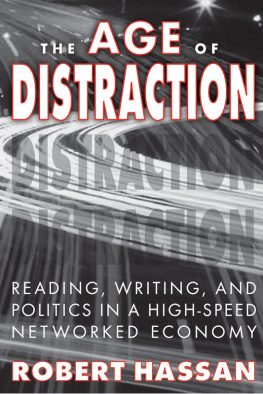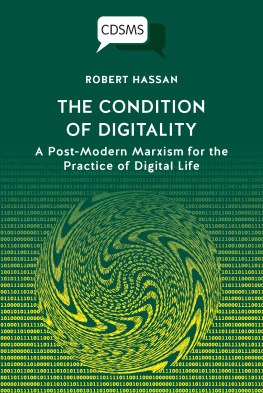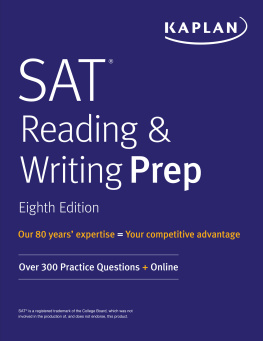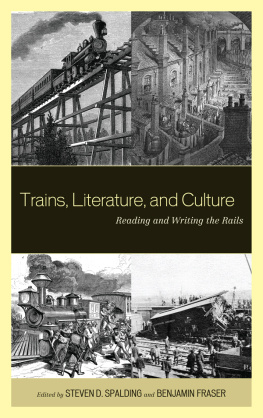

Copyright 2012 by Transaction Publishers, New Brunswick, New Jersey.
All rights reserved under International and Pan-American Copyright Conventions. No part of this book may be reproduced or transmitted in any form or by any means, electronic or mechanical, including photocopy, recording, or any information storage and retrieval system, without prior permission in writing from the publisher. All inquiries should be addressed to Transaction Publishers, RutgersThe State University of New Jersey, 35 Berrue Circle, Piscataway, New Jersey 08854-8042. www.transactionpub.com
This book is printed on acid-free paper that meets the American National Standard for Permanence of Paper for Printed Library Materials.
Library of Congress Catalog Number: 2011012445
ISBN: 978-1-4128-4306-5
Printed in the United States of America
Library of Congress Cataloging-in-Publication Data
Hassan, Robert, 1959
The age of distraction : reading, writing, and politics in a high-speed networked economy / Robert Hassan.
p. cm.
ISBN 978-1-4128-4306-5
1. TimeSociological aspects. 2. Distraction (Psychology)Social aspects. 3. Information technologySocial aspects. I. Title.
HM656.H377 2011
303.483301dc22
2011012445
For Kate, Theo, Camille, and for rooms full of books
Contents
Preface
So you will find hereonly the figurations of the bodys prehistoryof that body making its way toward the labor and pleasure of writing.
Roland Barthes
Karl Marxs son-in-law, Paul Lafargue, wrote a remarkable and acerbic pamphlet in 1883 titled The Right to be Lazy. For Lafargue, the right to time for oneself was the most important right that people should strive for. As he saw it, though, this fundamental human entitlement was being buried under the dead weight of industrial capitalism, a system that compelled people to sell much, if not most, of their time to the capitalist. An even worse assault on Lafargues revolutionary sensibilities was that workers themselves had become complicit in the outrage. Instead of rising in rebellion, as his father-in-law had anticipated they would, they were willingly indulging in a kind of self-abasement by not demanding time to be free, but demanding the right to work, the right to become slaves to regular wages and to the rhythm of the machine.
By the late-Victorian era, it seems, we had already lost sight of the value of timethe value of time for ourselves at any rate. Time, in the more accurate predictions of Benjamin Franklin a century earlier, had become synonymous with money, and money was now the DNA of capitalism. The increasingly powerful and pervasive machine culture swallowed up the time that could be spent considering The Greeks in their era of greatness. But in the culture of industry and capital the proletariat had dishonored themselves and allowed their consciousness and their understanding of the true value of time to be perverted by the dogma of work. The solution, for Lafargue, was that machines must be brought under the control of people instead of people being the tools of an inhuman system. Only socialism could only bring this about, he imagined, and under such an enlightened and democratic rule, an iron limit of three hours a day would be the maximum amount of toil for all.
The Right to be Lazy was possibly the wrong argument at the wrong time, and was received (outside of the prison house where he wrote it) with a deafening silence. The term lazy had and still has all the negative connotations that grate against the protestant work ethic that supposedly underscores capitalism. Moreover, he seems to have anticipated its less than rousing reception amongst the masses, and concludes with a weak and lamenting cry into the teeth of much louder winds of change: O Laziness, mother of the arts and noble virtues, be thou the balm of human anguish!.
We never hear much of Lafargue these days. Maybe the ghastliness of the industrial way of life was too much for him. The proletariat seemed not to be listening to his warnings of time robbery and machine dictatorship. In any case he and his wife concluded a suicide pact and killed themselves in 1911. This was the very year, coincidentally, that Frederic Taylors The Principles of Scientific Management appeared, a book that revolutionized nature of the human interaction with machines and, some say, served fundamentally to harness people ever more tightly to the logic of machine-based production.
Today, the need to be free from the shackles of the machine sounds to many to be an odd and archaic notion. In the West at least we are often told that we have moved beyond the dark satanic mills that Marxs compatriot Friedrich Engels wrote about in the mid-nineteenth century. Today we are purportedly far more progressive and far more civilized. Certainly, people are still brutally exploited in the factories that make our shoes and shirts and electronic gadgetry in Latin America, in wide stretches of Asia and elsewhere across the world. But the prevailing notion is that it only has to be pointed out to Nike or Gap or whomever, that such unpleasantness is occurring in their sub-contracted production lines, and the problem will be fixed. Local exploiters will be told to raise wages and shorten work hours. Slowly, slowly, things are getting better. Such things take time. And in the fullness of time the Chinese production worker will also have her trainers and her iPhone; paid for with her own money. She will have joined the global leisured class, the class that does different kinds of work, with greater rewards, and are freer than ever from what drove M. Lafargue to suicidal despair.
The trouble is none of this is true. Workers in sub-contracted factories will work hard and long until they become too expensive and by which time they will lose their jobs to others who are willing to work harder and faster and for less. The West benefits from this exploitation, to be sure, but only in a strictly material sensecheap clothes and cheap electronics. Hyper-exploited Latin Americans and Asians may have little time to consider the meaning of life, but neither do the service class or information workers in the richer zones of the globalized economy have that particular privilege, either. All of us inhabit a networked society that is, in the phrase used by time-theorist Hartmut Rosa, an accelerated society (2003). It is a society made possible by machines that run faster than machines have ever run before.
The machines in question are, of course, computers; machines that process information at a rate of speed that only increases, whilst dragging individuals, communities, businesses, governments, societies, and cultures into its hurtling and erratic trajectory that is heading to no-one knows where. And Moores Law and new advances in memristors, quantum computing and chemical computing are combining to ensure that there are no known limits to how fast computers are able to process more and more amounts of information. Yet, hardly anyone considers whether this is actually a good thing or not. The computers that suffuse every nook and cranny of society also accelerate it ways we barely understand. Indeed, in what is becoming the irony of our digital agewe do not have the time to think about the consequences of speed because our society is moving and changing so quickly. Not many of us any longer has the time to be lazy by choice, and therefore few have that precious time to consider whether a Lafarguian laziness might actually have benefits.
Next page










